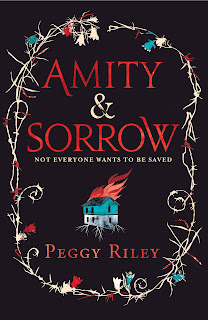There is something oddly titillating about the idea of polygamy, especially when it runs counter to the prevailing culture. Why would a group of free and consenting women choose to share one man? As for the husband... well, perhaps that's self-evident. Not so long ago, The Sunday Times ran a feature on the so-called 'rampant rabbi' of East Sussex and his seven wives. In an attempt to justify his lifestyle, the husband told the newspaper: "A man is capable of looking after more than one wife and it's natural that a woman needs covering and safety."
 |
| God, sex and farming |
When it comes down to it, our fascination with polygamy revolves around sex. How seven wives share the housework is less interesting. Rather we want to hear about the antics in the bedroom. In Peggy Riley's debut novel, Amity & Sorrow, there is plenty of sex to sauce her portrayal of a fundamentalist, polygamous cult. Sexual relations evolve into a ritualistic act to bind together Zachariah, the patriarch, and his fifty wives. More significantly, the nub of the story - the crisis that sets everything in motion - turns on a repugnant act of sex.
The book begins with the flight of Amaranth (the first wife) and her two daughters, Amity and Sorrow. They leave behind a secretive and insular community in Utah, on the brink of self-destruction. For four days, Amaranth drives non-stop before crashing the car on a farm in Oklahoma. Soon after their arrival, Sorrow suffers a miscarriage - or at least that is what we deduce as nothing is over-explained. This slightly fuzzy storytelling enhances the 'otherness' of Amaranth and her daughters. We can feel sympathy towards them, but it will take a while before we truly understand them.
The events of the novel unfold like a series of revelations, very much in keeping with Sorrow's apocalyptic view of life, imbibed directly from her charismatic, but deeply suspect father. We are not alone in having to piece together the fragments of their story. Even Bradley, the jaded farmer on whose land they end up, can't help but feel curious.
"Are you married? he asked. He has no idea." There follows four paragraphs of Amaranth's thoughts before the question is finally answered: "Yes she is married and married again. She is married fifty times, once for every wife. She was married to him first and last, married to him always."
It is like a riddle that we have to solve. Amaranth still feels bound to her husband and the dogma of her former community, but her delay in answering shows a competing need to suppress the past. This dynamic runs throughout the novel as Riley weaves together Amaranth's backstory with the family's new life on the farm, often using the same motifs in both settings: fire, a key, seeds, the wives' habit of spinning in religious ecstasy.
The relationship between the two sisters also forms a central axis of the novel. Their names give them symbolic status, although Riley's characterisation saves them from becoming one-dimensional. Amity feels bound to her dangerous and delusional sister, through affection as well as a material strap (another symbol) that often attaches them to each other by the wrist. Inevitably it is Sorrow who yearns to go home, while Amity begins to adjust to their new reality, learning to read and integrate with people on the farm, including a young farmhand called 'Dust'.
Amity is also the bridge between her sister and her mother, who encourages her daughters to break the old rules. Early in the book, Amity feels "suspended" between the two of them. Later on, "she knows that she is the strap, stretching between what Sorrow is and what her Mother wants". The resolution of these complex family ties and their competing needs is grist for the mill.
This compelling novel explores the effects of extreme faith on an idealistic and vulnerable community. It takes us beyond sex and titillation to the desires and motives that sustain (and eventually destroy) this polygamous family. At the heart of it, Amaranth, the first wife, struggles to conform. "Every act of her husband's, every change in the church, she had moved her own line of what was acceptable, further and further away from her, for love." Her momentous decision to break free finally sets her on the path to redemption.
Emma Clark Lam read an advance copy of Amity & Sorrow. The novel will be published by Tinder Press at the end of March 2013. This article has been re-printed in P-oint magazine (issue 3, page 34).
2 comments:
Mmmm interesting stuff. And as for the East Sussex man and his seven wives, I love his comment about women needing "covering and safety"! Hilarious attempt at explaining things.
I know - what a word "covering" is! Makes women sound like prized mares. If you have a Sunday Times subscription the link to the article is:
http://www.thesundaytimes.co.uk/sto/news/focus/article1202383.ece
It makes for an interesting read! Thanks for commenting.
Post a Comment